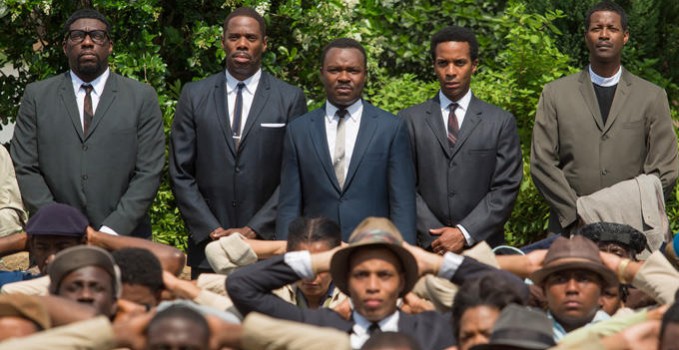So: we watched Ava Duvernay’s “Selma” again today, this time with two young black women who were at my parents’ home. And this is what I can tell you: they wept. And the movie is as good or better than the first time I saw it right after Thanksgiving. David Oyelowo’s performance is enormous, and all the other actors, especially Carmen Ejogo as Coretta Scott King, are exceptional.
The villain of the piece, Alabama governor George Wallace, hits just the right notes. And President Lyndon Johnson? If you pay close enough attention, he comes out a hero. Tom Wilkinson gives him just enough gruff to make him a dramatic foil for Oyelowo’s Martin Luther King.
“Selma,” let’s not forget, IS nominated for Best Picture. It can still win. And probably should.
“Selma,” I’d say, was the victim of a smear campaign. I’m not sure if it was on purpose. But it began with a piece that Politico picked up authored by the head of the Johnson library, one Mark Updegrove. He published a book in 2012 called “Indomitable Will” about the Johnson presidency, and was obviously looking for some publicity. He got it. He’s all over the place, no doubt very pleased with himself.
The Huffington Post jumped on the piece after it was published on December 22nd, and the rest of the press followed, as usual, like lemmings. “Selma” suddenly was to be dismissed for futzing with the facts as if no other movie based on history had ever done that.
And really, as many people said to me at that point, black people had had their big year last year with “12 Years a Slave” and “Fruitvale Station” and “Mandela.” Wasn’t that enough?
Then came #OscarsoWhite and the claims that the Academy of Motion Picture Arts and Sciences was racist. (Ridiculous, and it’s run by a black woman.) Al Sharpton got involved, because why not? On Sunday Maureen Dowd threw her lot in. Today, it’s David Carr’s turn. Each is in the New York Times.
This much I know: both Richard Valeriani and Gay Talese, two legendary journalists who were in Selma for the march and saw the movie, have praised it a lot. Robert Caro, who’s written three volumes of LBJ biographies, told me hadn’t seen the movie, didn’t have an opinion, and slammed the phone down before I could ask him anything else. That wasn’t very nice.
There’s a big discrepancy about who came up with the Selma idea– Johnson or MLK. There’s also the debate over whether Johnson wanted the Voting Rights Act, or didn’t, and so on. LBJ was no angel. His biographers love him, and are fighting for his legacy. But you know, he was by all accounts a mean spirited politician who was an unhappy vice president. For 20 years he voted against all civil rights bills in Congress. The country literally blew up over Vietnam during his five years as president, leading to Nixon and a lot of terrible things.
That Johnson did become a fervent civil rights backer after 1957 is true. And the Civil Rights Act is his greatest legacy. So he was not a black and white fellow, but more gray, and very human.
In that case, I defer to Bill Moyers, who worked for Johnson and was there in the White House in 1965. On his blog he has written of “Selma”: “it’s a powerful but flawed film.”
Moyers says, in the plus column: “There are some beautiful and poignant moments in the film that take us closer to the truth than anything I’ve seen in other movies to date: the cruelty visited upon black people every day by whites and armed authorities; the humiliation they faced simply trying to register to vote (“Name all the county judges in Alabama!”); the courage and fear of those black people who put themselves on the line for freedom’s sake; the ambivalence in Martin Luther King Jr. as he faced the inescapability of leadership and constant threat of death. I cannot imagine the dread one had to subdue to step on that bridge that day.”
As for the Johnson rendering: “To my knowledge he never suggested Selma as the venue for a march but he’s on record as urging King to do something to arouse the sleeping white conscience, and when violence met the marchers on that bridge, he knew the moment had come: He told me to alert the speechwriters to get ready and within days he made his own famous “We Shall Overcome” address that transformed the political environment.”
Moyers continues: “Here the film is very disappointing…This is the moment when the film blows the possibility for true drama — of history happening right before our eyes.”
No historical film is perfect. We could zip through “A Beautiful Mind,” “Schindler’s List,” “Saving Private Ryan,” even the current “The Theory of Everything”– and find so much to quibble about. But is “Selma” a great film? Yes. Lyndon Johnson can take it, and whoever makes his biopic can fix what they didn’t like here. This isn’t about LBJ. It’s about Martin Luther King. Let’s not lose sight of that. Ava Duvernay has made a movie that will last for a long, long time. “Selma” is the most important movie of 2014-15. Let’s not get distracted from that.
PS The song “Glory” by Common and John Legend was nominated. And it’s spellbinding.

